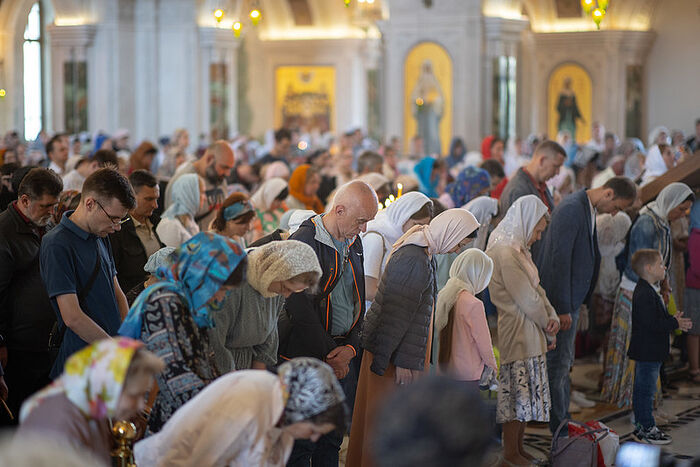How do modern Christians become lukewarm and why is prayer sometimes fruitless?
Many Orthodox readers who have paid attention to the problems of modern spirituality in spiritual literature have probably encountered the discussion of such a phenomenon as clergy burnout. Oddly enough, the problem of professional burnout (chronic stress leading to emotional exhaustion and moral fatigue), which is characteristic of managers and white-collar employees who live in big cities, is experienced by the clergy as well. It is worth noting that in the priestly ministry the issue of burnout is more profound, as it affects certain existential levels and meanings. It is associated with a loss of motivation and a permanent sense of monotonous spiritual routine. Eventually such a spiritual state results in an identity crisis. Naturally, this problem is the subject of separate and detailed discussions, but it leads us to interesting thoughts about the phenomenon of burnout among Orthodox laymen.
An Orthodox Christian who has been confessing his faith for two or three decades may begin to feel the futility of prayer. It may seem to him that the Lord no longer hears him and no longer responds to his requests. Confessing the same sins (which are most often a consequence of a person’s character and temperament) for decades can also lead him to a joyless awareness of the absurdity of what happens to him or his inability to truly repent and reform. Thus, the monotonous spiritual routine can affect the degree and meaning of a Christian’s faith, resulting in a crisis of faith. If this is not laymen burnout, then what is it? Again, we repeat, it is a profound problem that has no easy and unambiguous solutions. By the way, all spiritual imperfections and shortcomings, sins and passions take a long time strenuous efforts to heal. It is no coincidence that the image of a spiritual ladder associated with a gradual and complex process of ascent is so popular in Patristic ascetic literature.
Thus, since there are no ready-made solutions to this fundamental spiritual problem, at least some preventive measures can be taken that will protect us against a possible crisis of faith, “laymen burnout”. These rules are quite simple. Let’s call them “life hacks for tired laymen”.
First, don’t develop only the soul—don’t forget about your heart and intellect. Let me remind you about the banal things that the Orthodox Christian tradition is not a mere religion, although it may seem so to some. Orthodoxy is a very rich tradition consisting of theology, worship services, ascetic life, works of mercy, the art of iconography, and a host of other things. However, unfortunately, many modern Orthodox Christians associate our confession with only church services—true, they are beautiful, solemn and otherworldly—but by doing this these Christians denegrate this rich spiritual tradition.
For example, drop in at the church shop of your parish; you will see a minimum of theological and Patristic literature and will mostly find akathists and prayer-books. Meanwhile, back in the 1990s students of secular universities would enjoy reading the very complicated theological prose of St. Maximus the Confessor, or study the early Church from The History of the Church by Eusebius of Caesarea. This reading brought them to Christ. It is quite logical that by restricting yourself to attending the Sunday Liturgy and reading the akathist and the canon to your favorite saint privately you will reduce your faith to a monotonous routine. But if on the contrary you start reading commentaries on the Holy Scriptures daily, study beautiful early Church art, do good deeds, and exercise Christian social responsibility, you are very likely to avoid burnout. Nourish both the heart and the mind.
Secondly, learn to praise the Lord in your prayers, and not to ask for something from Him. Our faith often turns into a monotonous routine because we turn to God mechanically and automatically. Since in the Church service we see a certain instrument of influence on God (we constantly ask for something—that is, prayer becomes a way of deriving benefits), we subconsciously trivialize and simplify the service. The very rich liturgical tradition of Orthodoxy, which includes a huge number of feasts and commemorations of saints and wonderworking icons, poetically reflecting theological depths and consisting of hundreds and thousands of hymns inspired by God, in the mind of an average parishioner is reduced to the morning and the evening prayers and several “effective” akathists. In such a situation, it is very easy to convince yourself that you know everything about Orthodoxy. The world of such an Orthodox Christian revolves around an extremely limited set of rites and prayers, which may subsequently cause a sense of spiritual dissatisfaction.
If you don’t try to reflect on the content of Church hymns, but only look for useful patterns of “effective” prayers and the fulfillment of your prayer requests (for well-being, healing, etc.), then you are more likely to encounter insurmountable temptations of faith.
Thirdly, keep in mind that there is nothing more harmful than spiritual stagnation. Laypeople often turn to the clergy with such a complaint: “When I was a convert, prayer was fervent and sincere, and now, being an experienced Christian, I feel emptiness and the futility of my petitions to God. Why is this happening?” Where is the logic here? After all, a church-going and experienced Christian should be much more skilled in prayer than a neophyte or a nominal Christian. The whole point is that Christianity offers us an endless path of moral and spiritual perfection. There are no prolonged stops and limits on this path. However, damaged human nature often hinders progress on this path, inclining us to make simpler choices rather than the right ones. Why do neophytes get more satisfaction (some emotional, psychophysical “feedback”) from prayer, from fasting for many days, from participating in the sacraments? Because this whole universe of the Orthodox way of life is new to them. Neophytes are in an unusual state of a spiritual challenge and gaining mastery over themselves, that is why they receive such emotional and spiritual reward from prayer, services and fasting.
Meanwhile, experienced Christians have already developed a skill, and many of their actions are stereotyped: the lists of sins that they bring to confession are very repetitive, they choose a nice vegan diet to feel comfortable throughout Lent, etc. And it is not a subjective fault—it’s just our human nature: to simplify, standardize and adapt to the situation—so they lose the effect of novelty and spiritual joy. However, if an experienced churched Christian constantly sets himself new tasks in the spiritual sphere (for example, to practice ascetic life; there are many options in this field), then he will avoid the stage of spiritual burnout.
So, dear friends, if you stick to one of the proposed rules (which is not as simple as it initially seems), you greatly reduce the risk of burnout. May God help us!







